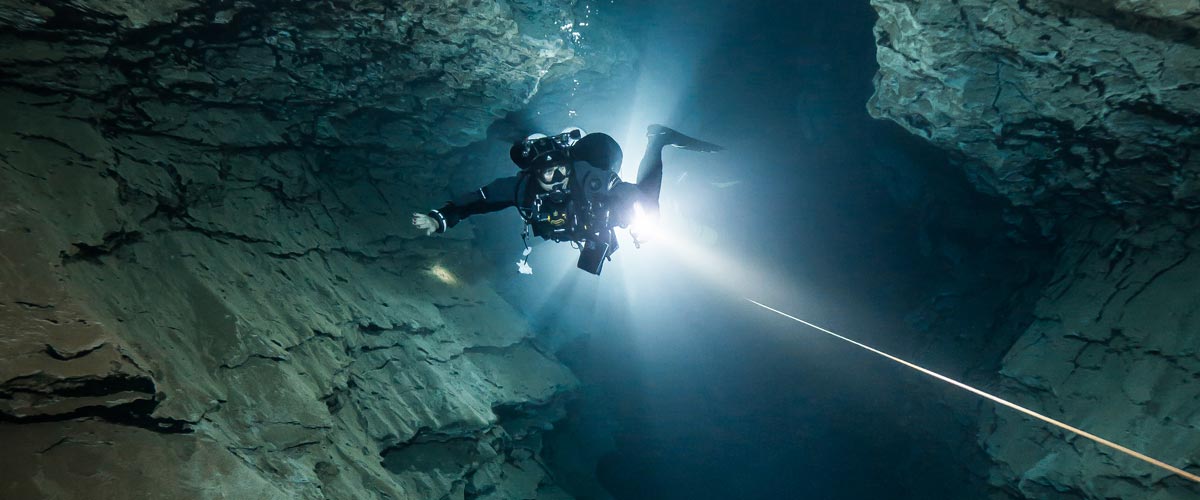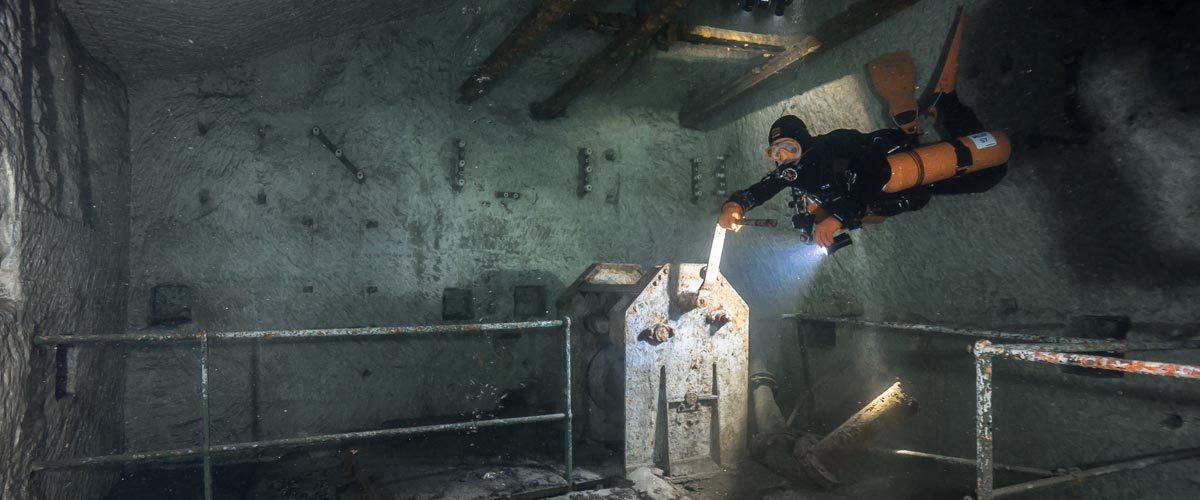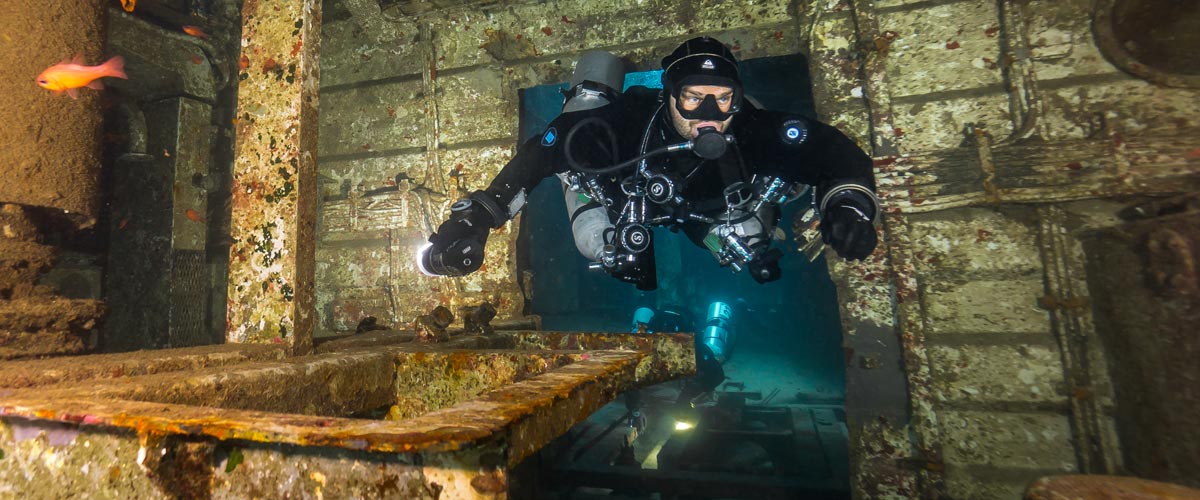Dive Training Blogs
Scuba Divers learning to Freedive: three different perspectives
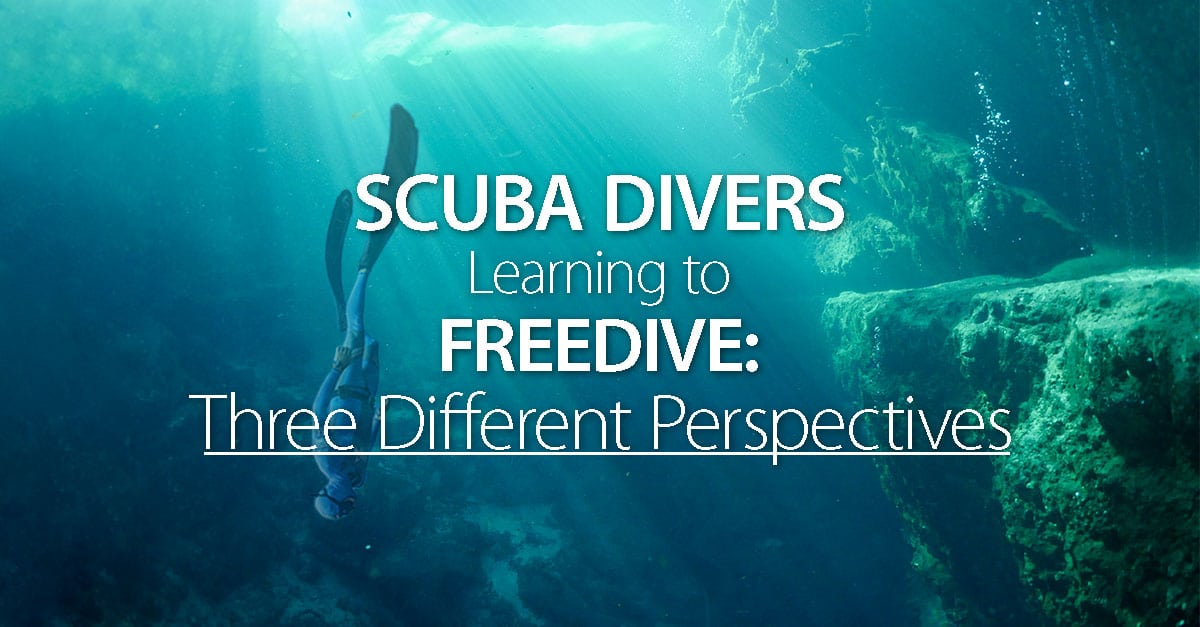
A New Scuba Diver
Hi, my name is Jessica Brown. This time last year I was sitting in my Open Water Scuba Diver Certification class. I caught the diving bug and dove every weekend after that and eventually through hard work made my way to become an SDI Master Diver.
Any time I go onto social media, I see pictures or videos of freediving. Even as a scuba diver, I saw freediving as an almost magical sport. These people were diving into depths that seemed impossible on a single breath of air. They were able to get closer to marine life without the marine life bolting away. I had to try this sport!
So many thoughts come to mind when I try to explain the class: amazing, challenging, and beautiful are the top choices. The eLearning and class sessions were well-detailed to the point that I was able to apply some of the information to everyday scuba diving in general (not the holding your breath part!). The truly amazing part of the course started in the pool with static holds. Hold my breath for a minute? Sure okay, two minutes? Ummm… maybe? Three minutes??? Yeah okay, that’s not possible… But I did it. At that moment, something clicked. My mental and physical barriers had just shattered. If I can push my body past that limit, what else can I do?
For the open water session, we went to a spring in Florida. Almost as soon as we were set up to get started, a manatee swam up to us. I cannot begin to tell you how absolutely amazing this experience was. Not only was I proving my mental and physical barriers can be pushed, but I also got to see this majestic creature in the wild. The manatee was curious about all of us, he would swim up to us and look us in the eye and watched us dive. Freediving has allowed me to interact with marine life in the wild which has always been something that I wanted to do. It’s one thing to go to an aquarium, it’s a whole new world to get to see beautiful marine life in the wild. I was not even done with the course and I was already experiencing a life goal.
After the day of diving, we stopped for dinner and sat at a table that had a painting with a quote. The quote is everything that I experienced that day: “Oh to slip beneath the surface and soar along the silent bottom of the sea agile and shining in water honeycombed with light” (Ellen Melay). Freediving provides this moment that scuba diving: a peacefulness that is beyond any other.
Scuba diving has opened so many doors for me, but freediving does the same while challenging me mentally and physically. I would not recommend freediving without certification or without a trained buddy, as it can hold more risk than scuba diving. I look forward to all the challenges that freediving will bring.
An Experienced Scuba Instructor
My name is Brian Shreve and I am an experienced scuba instructor. I teach rebreathers, I teach cave diving, and I’ve taught a ton of open water courses. I also enjoy learning and strive to learn something new every year. But, I’m reaching a point in scuba diving that there’s not a lot of “new” to learn. Enter freediving.
Last year, Performance Freediving International joined the International Training family (click here for more on that). At first, I wasn’t that interested. Been there and done that – early on in my instructor career with another agency, I used to teach breath-hold skin diving in the pool. I could do a 2-minute breath-hold. Couldn’t be much more, right? Wrong.
I was blown away with how much I learned in the PFI Freediver course. Not just about freediving, but also about myself. The course challenged me in ways I hadn’t been challenged since my first doubles course or my first rebreather course as a diver, and in ways I’d not been challenged before. So much of the activity is mental that freediving brings in a whole host of personal challenges and when met, a whole string of new personal bests. Each one of those as rewarding as the last.
Just like diving, much of the course is focused on safety and problem-solving. One of the things that separates PFI from many other freediving agencies is the focus on safety. The risks associated with freediving and how those risks are managed were an eye-opener from the perspective of a scuba instructor. The rescue techniques were also somewhat different, yet similar.
Classroom sessions followed by confined water and then open water made a comfortable, familiar progression. But rule number one is always hold your breath? And tuck your chin, don’t look down at the bottom/at the plate or up at the surface? Thousands of scuba dives have ingrained habits that had to be overcome to make proper freedivers with a clean entry and good form. But it was worth it.
By the end of the course, I had maxed out the allowed static apnea time of four minutes and had maxed out the allowed maximum depth of 20 meters. I had gone deeper on a single breath in the PFI Freediver course than I had gone during my open water scuba course. And the feeling of accomplishment it gave me was unparalleled. So much so, that I went on to take the PFI Intermediate Freediver course, the Safety Freediver course, the Freediver Supervisor course, and now hold the level of Assistant Freediver Instructor. I am one challenging skill away from teaching new PFI Freedivers myself.
Oh, yeah, and the manatees were super cool too!
A Freediver Instructor
I’m Chris Bustad, an instructor for Performance Freediving International. I’ve had several hundred freediver students on my line over the years. Looking at the people who have taken my courses, I would say roughly one third are interested in freediving and haven’t taken a scuba course, one third are scuba certified and will continue to dive on scuba but want another tool in the box, and the final third are scuba divers who don’t want to put tanks on anymore. Jessica and Brian both fell into the middle third.
Even with their experience levels so different, the challenges they met were roughly the same, just at different points into the static or the dive. They both had to get rid of the chattering monkeys on their shoulders telling them they need to come up to breathe. I tell my students frequently, never say your personal best is “only” anything. Your personal best is your world record, you are battling the same demons that those that go deeper or stay longer are going through or have been through. Any personal best is worthy of some pride.
What made them both successful students was their willingness to listen to what I said, and trust in the methods. Trust in the techniques, the depth and time will come! Trust in your trained buddy that is safetying you and the depth and time will come more easily.
For me, there is always great satisfaction when I get to watch students push themselves beyond what they thought possible. That’s why I keep doing this. And for the manatees. Always for the manatees.
To find out more about International Training, visit www.tdisdi.com.

Blogs
Intro to Tech: What is it about?
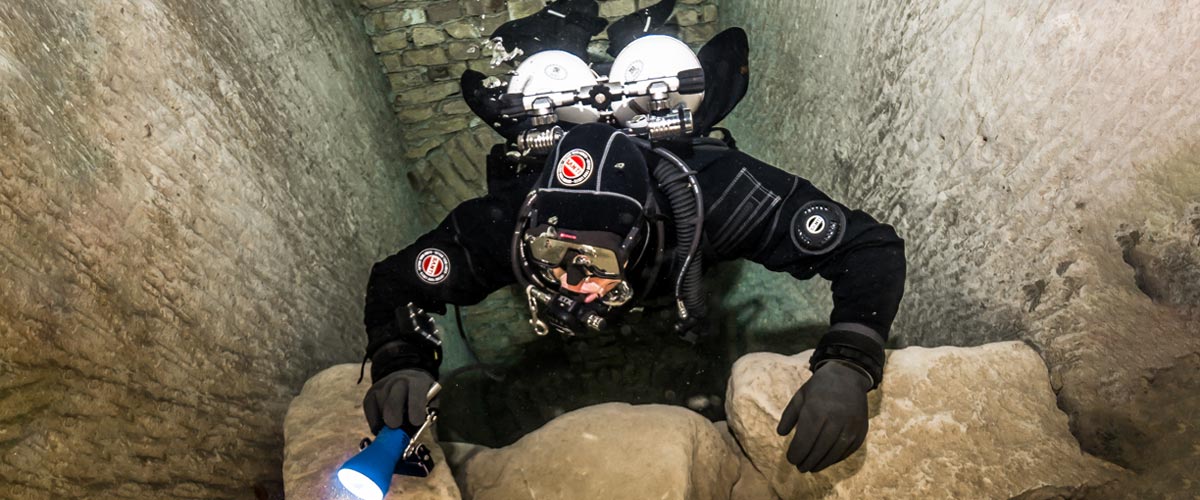
Article by José Pablo Mir
Pictures by Cezary Abramowski
The world of technical diving is exciting. It opens the door to new sites, depths, and bottom times. More importantly, it opens our minds to a new way of planning, facing, and experiencing dives, even those not purely technical.
Becoming a technical diver is a process, and like in other aspects of life, we should find the proper entry point that suits us best based on our knowledge and experience. The Introduction to Technical Diving course from TDI -the world’s largest and most recognized technical diving teaching organization- is the best option for divers who have yet to gain experience in the fundamental aspects of this new practice. The course’s content and its embrace of new techniques and technologies make it possible to acquire a solid foundation to learn and gain experience in this practice properly.
Becoming a technical diver is not something that happens overnight, whether deciding to become one or receiving a certification card stating we are now technical divers. It is a slow process extending farther away than any introductory course. It requires effort and dedication. But it will bring us satisfaction from day one -or two.
It is a matter of mentality
First, we must understand and accept that technical diving, involving greater depths, longer bottom times, exotic gases, virtual or real ceilings, and more, comes with higher levels of risk than the sport diving we have been practicing until now.
Although this discussion usually starts with a warning about risks, as I’ve done in the previous sentence, our practice is not a game of chance.
Technical diving is a rational activity that requires maturity and good judgment, and we will put everything into ensuring that each dive is a successful one -meaning we return from it safe and sound. With this understanding, we will strive to establish a mental attitude more aligned with our practice and its realities.
This new “technical diver” mindset we will develop will lead us to be more cautious in our executions, more analytical in our plans, more rational in our strategies, and more detailed in our procedures.
Experience will keep teaching us to know ourselves better, to keep our anxiety and other emotions under control, and to manage our impulses. Over time, our senses will sharpen, and we will be more attentive to the particulars of the situation we find ourselves in.
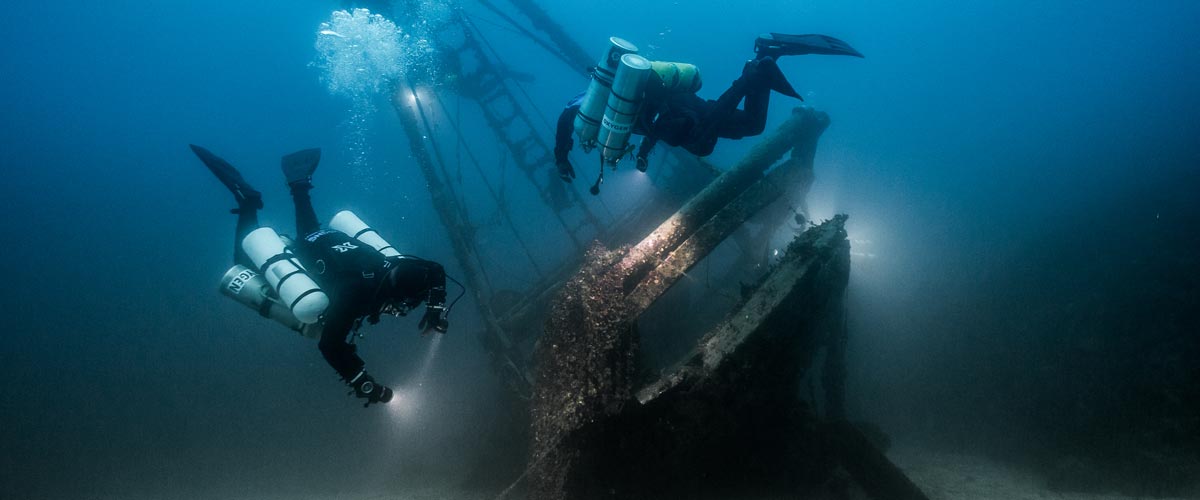
Strategies and procedures
Our strategies, those broad guiding lines tracing the path to follow, from how to approach planning to where, with what, and how we are willing to get there, will be more specific and more practical. Not because they magically become so, but because we will consciously and deliberately frame them that way.
We will establish clear, concise, and realistic procedures. Not only for the undesirable situations that may present themselves but also for those that are part of our dive objectives.
Even though, as technical divers, we often use equipment different from what we were previously accustomed to, it is essential to note that the gear does not make the diver. In a way, we could consider such equipment as the necessary tools to implement what our goal seeks to achieve, according to our strategies and procedures.
Technique plays an important role
We must put our greatest effort into learning and perfecting the different techniques we will be acquiring. Buoyancy, trim, propulsion, cylinder handling, deploying DSMBs and lift bags, valve drills, and more are essential skills we must begin to master to progress in our art. What we cannot do, when we need to do it, can harm us.
Our techniques must be effective and achieve the purpose for which they were devised. But they must also be efficient and require the least resources possible, including the time they take and the effort they demand. Effectiveness and efficiency will prevail over beauty and other considerations that may come to mind, although none of them should be mutually exclusive. A technique executed efficiently and effectively tends to have an inherent beauty.
Refining techniques is a lifelong mission. Some of them will be easy to master from the go; others, on the other hand, will be our life mission and will require many repetitions just to resemble the idea we have in mind of how they should be executed.
We must consider the environment
Our learning, the needs and musts of the practice we engage in, the experience we gradually gain, our strategies and procedures, and even our equipment and tools change with the environment.
Diving in the ocean, everything about us must be suitable for ocean dives. Conditions there rarely emulate those found in a pool, lake, or river. Variable winds and currents, greater depths, visibility conditions, other divers with uncertain skills around us, marine life, maritime traffic, distance from the coast, and many other factors add complexity and uncertainty.
It is never necessary to master the pool on the first day, but planning and aspiring to gradually cope with the ocean’s conditions is essential.
The cost of good training
We are aware that our resources are often scarce in relation to the possibilities of use we could give them if they were not. To a greater or lesser extent, we are part of the economic reality in which we are embedded.
Fortunately, the cost of good technical diver training is not an entry barrier. Comparing training and equipment costs, we see that the former are generally lower. Yes, lower cost for personalized service, essential to our future
performance and safety, than for a series of mass-produced products that are mere, albeit necessary, tools for an end.
The value of good training
The value of the training we received encompasses a range of characteristics, from emotional and methodological to technical and technological. TDI and its Introduction to Technical Diving course offer a deep and modern approach, with a teaching strategy that aims to create thinking divers, not merely obedient ones.
As technical divers, our knowledge is our primary tool. In this type of activity, what we don’t know can harm us.
Is this course optional?
Unfortunately, the fact that this Introduction to Technical Diving course is not a prerequisite for any subsequent training is an invitation to consider it optional. And we all know what usually happens to “optional” under budget constraints.
However, this course should be seen as optional only by those divers who are somehow familiar with the use of technical equipment, who have a mindset more in line with the requirements of this type of diving, who plan and execute the dives the proper “technical” way, who know their gas consumption rate, who are not intimidated by non-decompression tables, who feel comfortable using their dive computers, and know the techniques and have at least an acceptable level of buoyancy, positioning, and propulsion. Those can go straight to a more advanced training course, such as TDI’s Advanced Nitrox.
We must ask ourselves whether or not we are in that group.
Remember our goal: to have fun
Recreational diving is our passion. Jumping into the water carrying heavy equipment and having properly dotted our I’s and crossed our T’s have only one ultimate goal: fun. This is the activity we have chosen as a hobby. We must enjoy it; it must give us pleasure and make us vibrate.
Having a good time is not optional!
Blogs
Four opportunities to go pro in 2024 with Dive Friends Bonaire
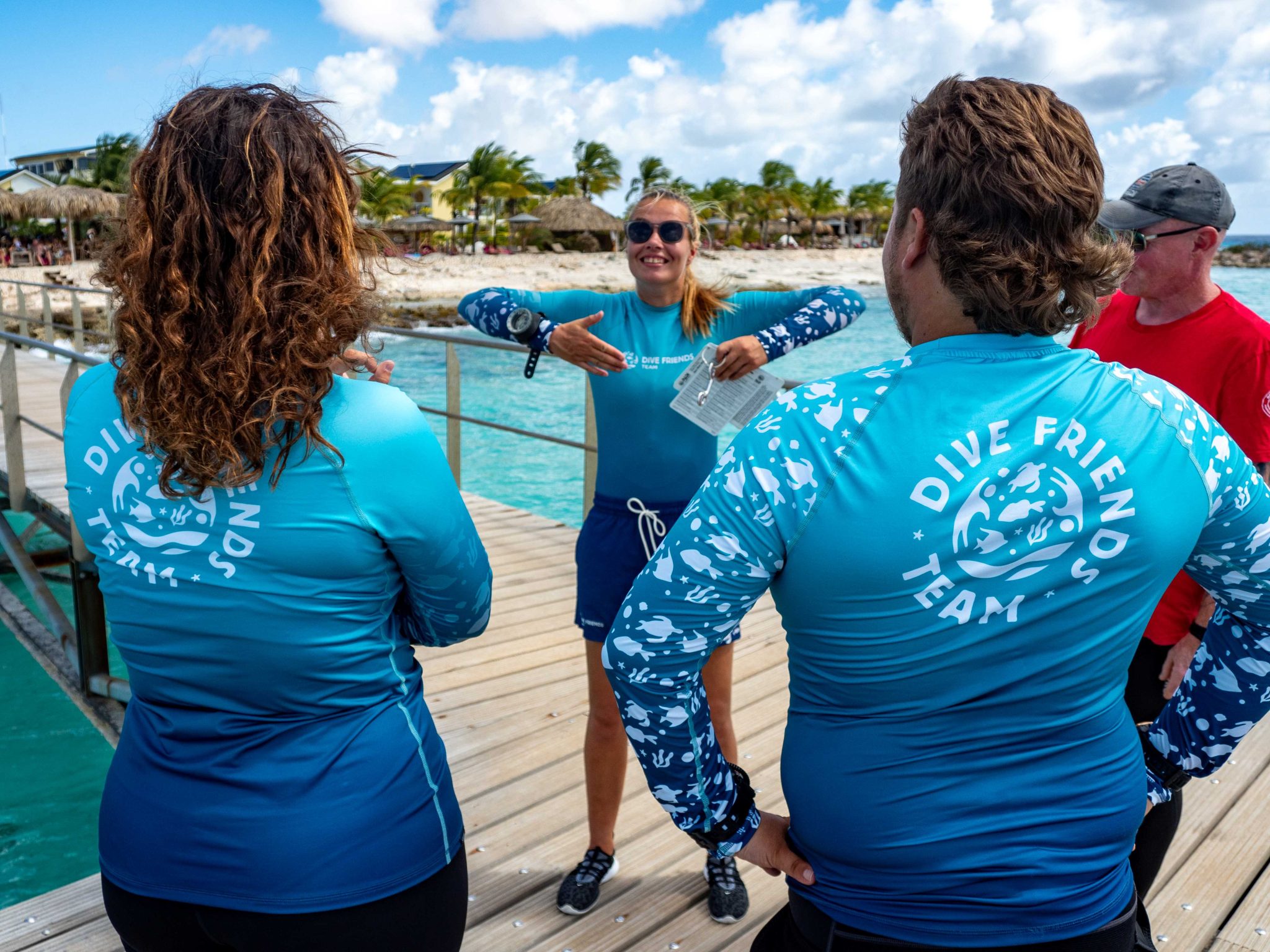
Dive Friends teaches the Instructor Development Course (IDC) several times a year to students who are eager to share their passion for diving with the world.
Dive Friends is known for the personal approach throughout the course. Their in-house course director will lead the students through every essential step, mentoring them to achieve their fullest potential as a dive instructor.
Applications for the following IDC start dates are now open:
- 12 April
- 5 July,
- 20 September
- 29 November
Partnership with Casita Palma
If the student opts for the IDC-Deluxe or IDC-Supreme package, their accommodation will be arranged for them at Casita Palma. This small and quiet resort is within walking distance from Dive Friends Bonaire’s main dive shop location and has everything you need to relax after an intense day of IDC training. Breakfast is included, so the student will always be fuelled and ready for their day.
Contact Dive Friends Bonaire’s Course Director Eddy for more information: coursedirector@divefriendsbonaire.com.
-

 News3 months ago
News3 months agoHone your underwater photography skills with Alphamarine Photography at Red Sea Diving Safari in March
-

 News3 months ago
News3 months agoCapturing Critters in Lembeh Underwater Photography Workshop 2024: Event Roundup
-

 Marine Life & Conservation Blogs2 months ago
Marine Life & Conservation Blogs2 months agoCreature Feature: Swell Sharks
-

 Blogs2 months ago
Blogs2 months agoMurex Resorts: Passport to Paradise!
-

 Blogs2 months ago
Blogs2 months agoDiver Discovering Whale Skeletons Beneath Ice Judged World’s Best Underwater Photograph
-

 Gear Reviews2 months ago
Gear Reviews2 months agoGear Review: Oceanic+ Dive Housing for iPhone
-

 Marine Life & Conservation2 months ago
Marine Life & Conservation2 months agoSave the Manatee Club launches brand new webcams at Silver Springs State Park, Florida
-

 News3 months ago
News3 months agoWorld’s Best Underwater Photographers Unveil Breathtaking Images at World Shootout 2023















